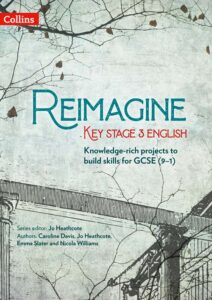Jo Heathcote is a teacher, coach, former AQA principal examiner for GCSE English/English Language, and author of multiple Collins English resources, including the new Reimagine Key Stage 3 English. In this article, Jo explores why it’s time to re-think KS3 English and how you can use her nine knowledge-rich projects to create a firm foundation for GCSE (9-1) English.
 Reimagine Key Stage 3 English is a project-based resource designed to underpin teaching at KS3 by equipping students with the core skills of comprehension, knowledge about the language and structure of texts and plentiful writing opportunities all wrapped up in thematic packages that allow students to develop over time.
Reimagine Key Stage 3 English is a project-based resource designed to underpin teaching at KS3 by equipping students with the core skills of comprehension, knowledge about the language and structure of texts and plentiful writing opportunities all wrapped up in thematic packages that allow students to develop over time.
The seeds for this resource had been germinating at the back of my mind for some time.
I’d been involved in the development of the new GCSE English Language for one of the major exam boards in my role as Principal Examiner for Foundation tier, and it was through this experience that I developed my GCSE (9-1) Exam Practice textbook for Collins. I wanted to establish a clear methodology for students at GCSE to achieve success by directly targeting the assessment objectives and alleviating all of the mystery of GCSE and what I considered to be its greatest myths: there isn’t a right or wrong answer; the marking of English is subjective; you can’t learn anything or revise for English. All of these myths are the things that cause anxiety or disengagement for the least confident student.
Almost as soon as that was published, I began to hear that some schools were so anxious about the demands of the new specification they had started teaching some of the texts way from Year 7. My thoughts turned to KS3: how could we seamlessly embed the skills required for the new KS4?
The previous approach: teaching GCSE at KS3
The vision for the Reimagine Key Stage 3 English projects came after I returned to Key Stage 3 teaching as Head of Department. I was disappointed to learn that, before my arrival, students had basically been starting GCSE in Year 7. I decided to implement my GCSE methodology with the Year 10 and 11 I’d inherited, but find a way to roll this back into Key Stage 3. That way, when students came to Key Stage 4, they would have key methods securely in place and would only need to practice and apply them to the specific questions on the Language paper and the essay tasks on the Literature papers.
It meant that at Key Stage 4 we could focus on building confidence with approaching unseen material, develop writing skills and really enjoying the study of the Literature texts, knowing that every student had clear methods for addressing the exam tasks already in place.
And so: long before Ofsted decided to frown on this, I removed all of the references to Key Stage 4 from Key Stage 3. I didn’t want students to become bored to tears of their rich Literature texts: I wanted them to experience more texts and different texts. When GCSE is very prescriptive, with no room for coursework, Key Stage 3 is the magical opportunity for departments to use all three years fully to introduce a varied, diverse and broad experience.
For each Year group, I introduced a work of modern prose, a collection of poetry, and a Shakespeare text we were definitely not going to study for GCSE! But what was I missing? It was out of this that Reimagine Key Stage 3 English came to life.
Creating the projects: introducing varied texts
I created one project for each year group based on an overarching theme for the Year: for example, the theme ‘How We Treat Others’ came about as we were studying The Diary of Anne Frank for our prose study, a collection of war poetry from WW1 to the present day and The Merchant of Venice in Year 8. The projects I created represented a half term’s work alongside my other texts and study. Slowly the vision of a wider resource emerged that could be used in each term or in a differentiated way to underpin teaching at Key Stage 3 and introduce clear methodologies from Day 1 of Year 7 for all students, no matter what their previous skills had been from various primaries.
In developing the idea for Collins, I decided each project should contain some 19th century prose, some classic poetry, lead into some creative writing, then switch to nineteenth century non-fiction, as I knew this was a source of anxiety for many colleagues. We would then link in some modern non-fiction and finish with discursive writing. The projects were not just about imparting comprehension and analytical skill though. I wanted each project to contain a range of texts on a key theme to build contextual knowledge and cultural capital in a way that was more subtle and not ‘bolt on’ quasi history lessons. It’s just my personal view, but for me, nothing kills a text more than starting it with three weeks of ‘The Life of Dickens’! Advice from examination boards for many, many years has also been to avoid this approach in essays too: contextual understanding should come out of the study of the text, not the other way around.
Transformative results
And the results? Within my own department, we saw students becoming very confident with AO1 comprehension methods by the start of Year 8, confident with AO2 analytical methods by Year 9, and able to build the longer essay type responses before embarking on GCSE. With a range of abilities and a high number of EAL students, we then saw a clear increase in our GCSE exam performance compared to similar centres.
I really hope this five-year vision is one which supports and helps colleagues in many centres. Now I’ve got the Key Stage 3 bug, I’m already reimagining what’s next!
Find out more about Reimagine Key Stage 3 and download free samples to try with your students.



